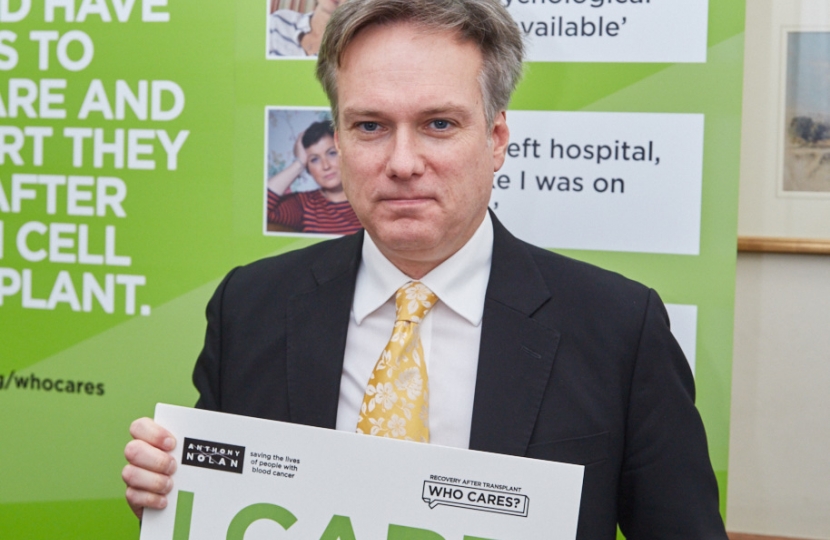
Henry Smith MP has backed blood cancer charity Anthony Nolan’s ‘Who Cares?’ campaign, calling for better care for people recovering from a stem cell transplant.
The Crawley MP, who has chaired the All-Party Parliamentary Group on Blood Cancer since its formation in June 2016, attended the event to help raise awareness of Anthony Nolan research which found that one in five stem cell transplant patients are not offered any specialist care to help with their recovery, which includes access to physiotherapists, counsellors, and fertility experts.
This is despite patients often being known as ‘patients for life’ due to the long-term side-effects of the treatment.
Henry said;
“No patient’s recovery should be made more difficult by a lack of care and support, and that’s why I’m backing Anthony Nolan’s campaign, urging health commissioners to review the care arrangements they have in place once transplant patients leave hospital.
“I’ve written to the Health Secretary with regard to this campaign and it’s my privilege to chair the Blood Cancer APPG. As we come to the end of its inaugural inquiry into NHS blood cancer care with a report due in the coming months, this is not the end of my campaigning for better treatment for blood cancer patients and their support networks, but simply the start of the Group’s work.”
Anthony Nolan is calling on health commissioners across the UK to urgently review the care arrangements they have in place for transplant recipients once they leave hospital, to ensure that patients and their families can continue to access vital support and services.
National commissioners pay for any treatment needed by patients for the first 100 days after transplant. After this point, responsibility for funding services passes to local commissioners – in England, the patients’ local Clinical Commissioning Group (CCG).
However, a Freedom of Information request by Anthony Nolan found that at present, fewer than one in ten (9 per cent) CCGs have specific arrangements in place.
At the event in the House of Commons on Wednesday 11th October, Henry Smith MP heard from patient representatives about how difficult recovery can be without appropriate support.
Henny Braund, Chief Executive of Anthony Nolan, said;
“It’s vital that health commissioners carry out an urgent review into the long-term care that stem cell transplant recipients need throughout their recovery, so we’re delighted to have the support of Henry Smith MP in raising awareness of this issue in Parliament and in their constituency.
“Anthony Nolan is calling on health commissioners to work with us and the clinical community and make sure that post-transplant care works for every patient, to ensure they get the support they need to make a good recovery.”
Earlier this month the Crawley MP submitted a Written Parliamentary Question to the Department of Health concerning support for patients recovering from a stem cell transplant; receiving a response on 16th October.
Henry Smith MP asked the Secretary of State for Health, Rt Hon Jeremy Hunt MP;
“To ask the Secretary of State for Health, what steps his Department is taking to improve access to psychological support for patients recovering from a stem cell transplant.”
The Parliamentary Under Secretary of State for Health, Jackie Doyle-Price MP, responded;
“The impact of cancer continues beyond the initial treatment. Patients may experience physical, financial, social and psychological issues.
“NHS England are rolling out the Recovery Package, which will ensure patients have more personal care and support from the point they are diagnosed and once treatment ends. For patients this means working with their care team to develop a comprehensive plan outlining their physical needs and other support they may need, such as help at home or financial advice.
“By 2020 NHS England wants all cancer patients to have access to the Recovery Package and is committed to implementing this in collaboration with charities, professionals and patients themselves.”
Follow Henry daily via:
 www.twitter.com/HenrySmithUK
www.twitter.com/HenrySmithUK
 www.facebook.com/HenrySmith4Crawley
www.facebook.com/HenrySmith4Crawley
 www.youtube.com/HenrySmithMP
www.youtube.com/HenrySmithMP
Notes:
What is a stem cell transplant?
If a patient has a condition that affects their bone marrow or blood, then a stem cell transplant may be their best chance of survival. Doctors will give new, healthy stem cells to the patient via their bloodstream, where they begin to grow and create healthy red blood cells, white blood cells and platelets.
About Anthony Nolan
Anthony Nolan saves the lives of people with blood cancer. The charity uses its register to match potential stem cell donors to blood cancer and blood disorder patients in need of stem cell transplants. It also carries out pioneering research to increase stem cell transplant success, and supports patients through their transplant journeys. Every day Anthony Nolan gives three people a second chance at life.
What is a stem cell transplant?
If a patient has a condition that affects their bone marrow or blood, then a stem cell transplant may be their best chance of survival. Doctors will give new, healthy stem cells to the patient via their bloodstream, where they begin to grow and create healthy red blood cells, white blood cells and platelets.
Key statistics
- About 2,000 people in the UK need a stem cell transplant from a stranger every year
- 90 per cent of donors donate through PBSC (peripheral blood stem cell collection). This is a simple, outpatient procedure similar to giving blood
- Anthony Nolan need more young men to sign up, as they are most likely to be chosen to donate but make up just 15 per cent of the register
- The charity needs more people from Black, Asian and minority ethnic (BAME) backgrounds to sign up. Only 60 per cent of transplant recipients receive the best match. This drops dramatically to around 20 per cent (one in five of transplant recipients) if you are from a Black, Asian or ethnic minority background.
- To join the Anthony Nolan register, you must be 16-30 and healthy. Anthony Nolan’s world-leading Research Institute has shown younger donors offer better survival rates for patients.



